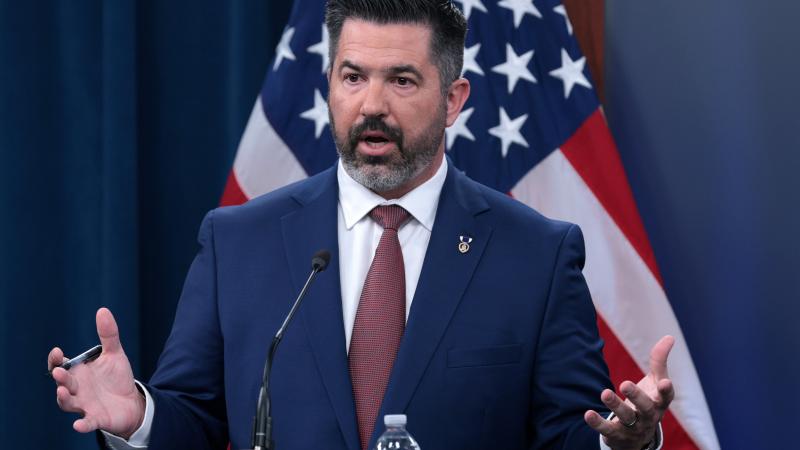Taliban, al-Qaeda relationship still unresolved as 9/11 anniversary, Afghan peace talks coincide
The Taliban "has still not shown conclusively that they are going to break with al-Qaeda," CENTCOM commander Gen. Kenneth "Frank" McKenzie said Wednesday.
For the first time in nearly two decades, the anniversary of the Sept. 11 terrorist attacks against the United States will be marked while peace negotiations are set to begin regarding Afghanistan. The talks will commence between Taliban and Afghan government negotiators on Saturday in Doha, the capital of Qatar, in keeping with a February agreement involving the United States.
"This opportunity must not be squandered," Secretary of State Mike Pompeo said in a Thursday statement. "Immense sacrifice and investment by the United States, our partners, and the people of Afghanistan have made this moment of hope possible."
After the Kabul government on Thursday released six prisoners — a precondition for talks — a Taliban spokesman said that his organization aims to work toward peace.
"The Islamic Emirate intends to advance the negotiation process in an appropriate manner and bring about comprehensive peace and a pure Islamic system in the framework of our Islamic values and higher national interests," Dr. Muhammad Naeem said in a statement.
Some have questioned, though, where the Taliban stands in its relationship with al-Qaeda, the extremist movement co-founded by Osama bin Laden, who orchestrated the Sept. 11 attacks that prompted the U.S. war in Afghanistan.
On Wednesday, the head of U.S. Central Command told reporters that the relationship question remained unresolved.
The Taliban "has still not shown conclusively that they are going to break with al-Qaeda," said Marine Gen. Kenneth "Frank" McKenzie.
The February 2020 peace agreement between the United States and the Islamic Emirate of Afghanistan — which is not recognized by the United States as a state and is known as the Taliban — specifies that the Taliban will not allow any individual or group, including al-Qaeda, to threaten the United States and its allies from Afghan soil.
While the agreement states that "enforcement mechanisms" are in place to prevent such threats, the underlying liaison between the Taliban and al-Qaeda appears to continue, according to one South Asia expert.
"Al-Qaeda's relationship with the Taliban has not always been steady, and while the two groups have had their differences, their relationship has remained intact for more than two decades now," according to Saurav Sarkar, a researcher at the Center for Air Power Studies in New Delhi, India. "Recent developments in Afghanistan have shown that the Taliban is unlikely to abandon al-Qaeda and may even permit the latter's activities as long as they benefit the Taliban operationally and are not traceable back to them."
The Taliban and al-Qaeda share similar understandings of fundamentalist Wahhabism, said Sarkar in an article for The Diplomat.
The disagreements have not been serious enough to prompt a split, he noted.
"Some Taliban elements were particularly frustrated by bin Laden's declarations of war and al-Qaeda's acts of terrorism against the United States in the years prior to 2001," Sarkar wrote.
"However," he added, "U.S. missile strikes on al-Qaeda camps in Afghanistan after the 1998 East African embassy bombings renewed Taliban support for the group."
The United Nations Security Council found this year that the two groups continue to be bonded.
"Relations between the Taliban, especially the Haqqani Network, and Al-Qaida remain close, based on friendship, a history of shared struggle, ideological sympathy and intermarriage," the council reported in May. "The Taliban regularly consulted with al-Qaida during negotiations with the United States and offered guarantees that it would honour their historical ties."
As such, the Security Council observed, the new peace agreement bears watching.
"The challenge will be to secure the counter-terrorism gains to which the Taliban have committed, which will require them to suppress any international threat emanating from Al-Qaida in Afghanistan," the report stated.
If the peace deal holds, international forces will withdraw from Afghanistan by May 2021. The Pentagon plans to reduce troop numbers there within about two months.
"We're on a glide slope [in Afghanistan] to be at 4,500 by the November time frame, late October, November time frame," CENTCOM chief McKenzie told media outlets.
Meanwhile, U.S. officials offered encouragement to negotiators in Doha.
"The start of these talks marks a historic opportunity for Afghanistan to bring an end to four decades of war and bloodshed," Pompeo said. "The people of Afghanistan have carried the burden of war for too long. They yearn for peace."
Added Pompeo: "I urge the negotiators to demonstrate the pragmatism, restraint, and flexibility this process will require to succeed."














